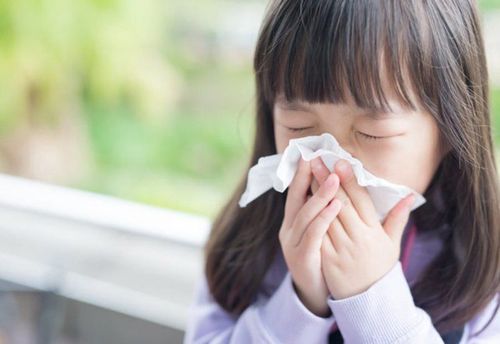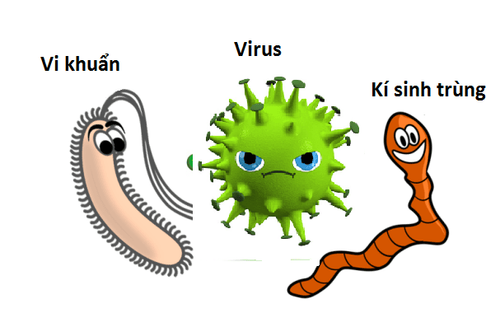This is an automatically translated article.
The article is professionally consulted by Master, Doctor Nguyen Thi Nhat - Department of Medical Examination & Internal Medicine - Vinmec Hai Phong International General HospitalInfluenza viruses cause significant morbidity and mortality in countries around the world. The same influenza treatment regimen is not always applied to all patients. Accordingly, flu treatment is not always done at home, but many cases need to be examined by a doctor, especially in high-risk cases.
1. Measures to treat influenza
The body's immune system is normally able to get rid of the viruses that cause the flu. Therefore, treatment for the flu is aimed at relieving symptoms until the infection clears and preventing complications. There are several flu treatment options outlined below:1.1. Treatment at home if the illness is mild and uncomplicated When there are signs of suspected influenza infection, the sick person needs to stay at home, rest and keep a distance, avoid close contact (if possible, should stay in a separate room), to prevent transmit the virus to others.
Use some symptomatic medicine if necessary to reduce fever and pain. Drink plenty of water to avoid dehydration. Smokers should stop during this time. Decongestant drops, throat lozenges and physiological saline solution for nasal drops, nasal irrigation are very useful to help relieve symptoms of the nose and throat.
Note: Parents and caregivers should not give over-the-counter cough and cold medicines to children under 6 years of age. There is no evidence that medicines work, but they can even cause side effects such as allergic reactions, sleep problems or hallucinations in children.
1.2. Use of antiretroviral drugs Specific treatment in influenza regimens and treatment is the use of antiviral drugs. Although the drug does not destroy the virus, it interferes with the process of the virus multiplying and entering the body's cells, thereby helping to reduce the duration of symptoms, helping the body recover sooner. Without antiviral drugs, a full recovery is possible, but medications can reduce the risk of complications, the severity of the illness, and the duration of symptoms.
The duration of antiviral therapy is usually 5 days and is best started within 48 hours of getting the flu (within 36 hours for zanamivir in children) or in contact with someone who has the flu. This follows the principle that antiviral drugs work when given to the patient as soon as possible, the better the effect will be.
Antiviral drugs can also be used to prevent people in high-risk groups for complications from influenza who are in contact with people with confirmed influenza, such as the elderly, those with underlying medical conditions, or young children. Children living in the same house as someone with the flu.
When to use antibiotics? Antibiotics kill bacteria, but not viruses, so antibiotics are not often prescribed to treat influenza viruses. However, antibiotics may be used if the patient has complications such as pneumonia.
2. When do flu patients need to be hospitalized?
If normally healthy, the person is usually unlikely to have complications and is likely to make a full recovery. However, people with flu with severe symptoms that don't get better with home flu treatments, or people with high risk factors for flu complications - as assessed by a doctor. , then hospitalization is required. Therefore, see your doctor for timely examination, testing and treatment if you are in a high-risk group, or you notice that your symptoms persist or worsen.
The most common complication is pneumonia. This can develop with a viral infection (ie, a secondary infection) and can often be quite severe. Prescription antibiotics will usually cure. However, bacterial infections can sometimes be life-threatening due to respiratory failure, especially in frail or elderly people.

Symptoms to look out for that may indicate secondary pneumonia include:
High fever, repeated fevers Coughing worse Shortness of breath Rapid breathing Chest pain Decreased peripheral blood oxygen levels Other complications when it occurs include sinus infections and ear infections. Other serious complications of influenza virus disease are rare, such as encephalitis (inflammation of the brain).
3. Who are more susceptible to the flu?
Adults 65 years of age and older Children under 2 years of age, with the highest rates of hospitalization and mortality in children under 6 months of age Pregnant women and 2 weeks after the end of pregnancy People in nursing homes or requires prolonged medical care
4. Who is at high risk of complications from influenza?
The following is a list of all the health and age factors known to increase the risk of serious complications from the flu:Asthma Neurological or developmental abnormalities neurological Hematological diseases such as sickle cell chronic lung diseases such as COPD, asthma Endocrine disorders (such as diabetes) Cardiovascular diseases such as congenital heart disease, heart failure, coronary artery disease Renal disorders Renal disorders liver disorders People who are obese People whose immune systems are weakened by disease (such as those with HIV or AIDS, or certain cancers such as leukemia) or medications (such as those being treated cancer or chemotherapy or people with chronic illnesses that require chronic corticosteroids or other drugs that suppress the immune system)
5. Effects of early treatment
The treatment for seasonal flu is prompt antiviral treatment of influenza for people who have the flu or are suspected of having it and who are at higher risk of serious flu complications, such as people with asthma. asthma, diabetes (including gestational diabetes) or heart disease. Influenza antiviral drugs are prescription drugs, so patients cannot self-treat their symptoms at home, especially in high-risk groups. Accordingly, it is important to tell your doctor immediately if you are at high risk of serious flu complications when you develop flu symptoms, including feeling feverish or feverish, cough, sore throat, runny nose or stuffy nose, body aches, headache, chills and fatigue. Your doctor can prescribe antiviral medication to treat the flu as soon as possible so that it can work optimally. Antiviral drugs are different from antibiotics, which fight bacterial infections. Also, antiviral treatment is most effective when started soon after the onset of the flu. This means that when treatment is started within two days of recovering from flu symptoms, antivirals can reduce fever and flu symptoms, shortening the duration of illness by about a day. In addition, antiviral drugs can also reduce the risk of complications such as ear infections in children, respiratory complications requiring antibiotics, and hospitalization in adults.There are currently four FDA-approved and CDC-recommended antiviral drugs for the treatment of influenza(*):
Oseltamivir phosphate: FDA-approved pill or liquid suspension for early treatment of illness influenza in people 14 days of age or older Zanamivir: an inhaled medication and is approved for the early treatment of influenza in people 7 years of age and older. Peramivir: given as a single intravenous injection and approved for the early treatment of influenza in people 2 years of age and older. Baloxavir marboxil: a single dose oral tablet and is approved for the early treatment of influenza in people 12 years of age and older (*) Note: The above are prescription medications and should only be used as directed. of the prescribing physician.

6. Co-infection with flu and COVID-19
Since 2019, the world has reported another strain of virus causing a global respiratory pandemic, COVID-19. COVID-19 may initially present with minor symptoms such as fever with or without chills, dry cough, shortness of breath, fatigue, muscle aches, sore throat, confusion, headache, and menstruation. The lungs are the main organ affected, which can lead to severe respiratory failure and a much higher mortality rate than the annual seasonal flu. In addition, the disease can also present with symptoms other than flu atypical, such as nausea, vomiting, and diarrhea.
Worryingly, influenza can co-infect with COVID-19 and be difficult to distinguish from one another. Most of these patients present with fever, cough, and difficulty breathing. All coinfected patients presented with sore throat. One of the co-infected patients developed acute respiratory distress syndrome and required a ventilator. Influenza and COVID-19 co-infections as well as pneumonia-causing pulmonary superinfections need to be recognized in order to decide on the appointment of antibiotic and antiviral therapy as soon as possible.
Early specific treatment improves the prognosis of people with co-infections, especially those at high risk. Because, subjects co-infected with influenza and COVID-19 will have an increased likelihood of severe progression and complications, including acute respiratory distress syndrome, respiratory failure and death if not promptly treated. Therefore, vaccination against respiratory infections is always recommended to be performed annually and repeated to reduce the risk of co-infection.
7. Notes on flu treatment and care for flu patients
Most people who get the flu have a mild illness and don't need specialized medical care, including hospitalization, antiviral medication, or oxygen. In most cases, if sick with flu symptoms, the sick person should stay home and avoid contact with others, except to see a doctor. The recommended stay at home time is at least 24 hours after the fever is gone. The fever will go away without the use of antipyretics. Until then, the sick person should stay home from work, school, travel, shopping, social events, and public gatherings. Limit contact to avoid infection. However, if you must leave home for medical care, wear a mask, cover coughs and sneezes with a tissue, and wash your hands often to avoid spreading the flu to others. Some people are at risk. If you're at risk for serious flu-related complications (including young children, people 65 years of age and older, pregnant women, and people with certain medical conditions), it's important to proactively contact your doctor as soon as possible. sick. This helps antiviral therapy to start as soon as possible, as effectiveness is greatest when treatment is started within 2 days of illness onset. Warning signs should seek medical attention immediately.In young children:
Rapid breathing or difficulty breathing Bluish lips or face Ribs pull in with each breath Chest pain Severe muscle pain that makes the child refuse to go Signs of dehydration (child has not urinated for 8 hours, dry mouth , crying without tears) Lethargy, lethargy Convulsions Fever over 40 ° C Infants under 12 weeks Fever or worsening cough Chronic illness (if any) gets worse In adults:
Shortness of breath or rapid breathing Persistent pain or feeling of pressure in the chest or abdomen Persistent dizziness, confusion Convulsions Not urinating Severe muscle pain Severe weakness or sitting, unsteady gait Fever or worsening cough Condition chronic illness (if any) getting worse

8. When taking care of people with flu, it is important to pay attention
Avoid face-to-face contact with the sick person. If possible, limit the amount of time in close contact with the sick person to limit the risk of infection. When holding a sick child, rest their chin on their shoulder so they don't cough in their face. Wash your hands often and properly. If soap and water are not available, use an alcohol-based hand rub. Make sure to wash your hands after touching sick people. Rinse after handling patient tissues or clothing. Promptly recognize emergency warning signs of flu and seek specialized medical care Children and adolescents 18 years of age and younger with the flu or suspected flu should not take Aspirin (acetylsalicylic acid). ) or any product containing salicylate as this can cause a rare, very serious complication called Reye's syndrome. In short, when you have the flu, if the body has good resistance, the disease will go away on its own. For high-risk cases, antiviral drugs will be an important indication for treatment of influenza virus disease. In general, the treatment of seasonal flu is similar to that of common respiratory infectious diseases, mainly respiratory hygiene at home, infection prevention and identification of dangerous and complicated subjects for intervention. specialized medical.
Please dial HOTLINE for more information or register for an appointment HERE. Download MyVinmec app to make appointments faster and to manage your bookings easily.














